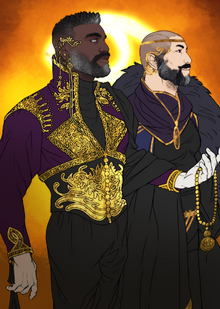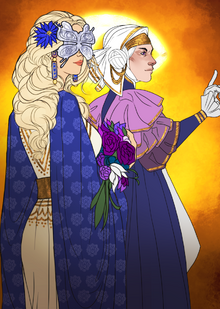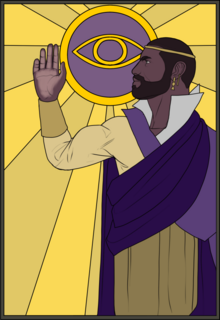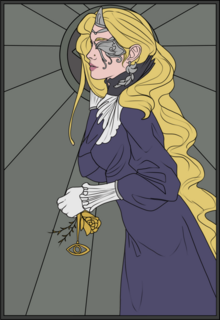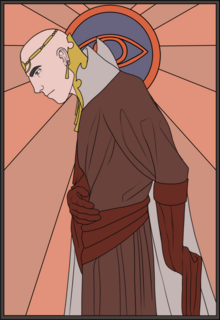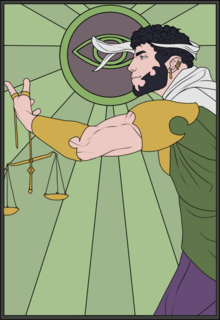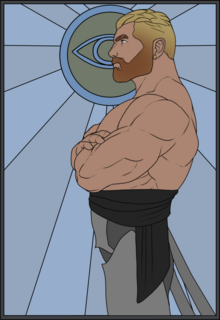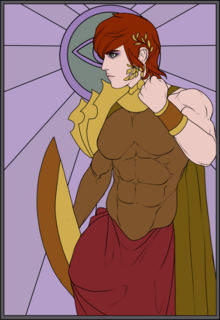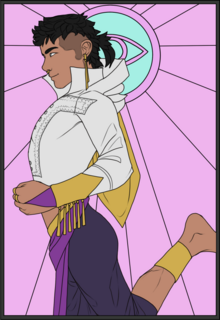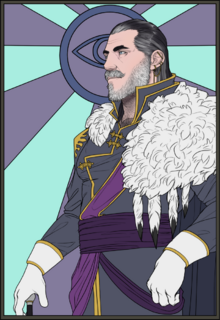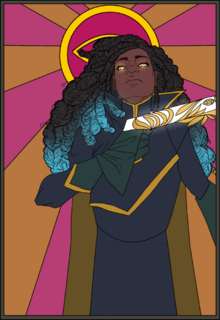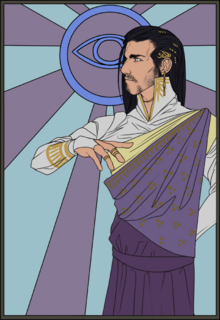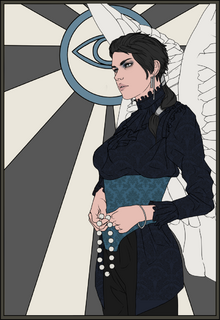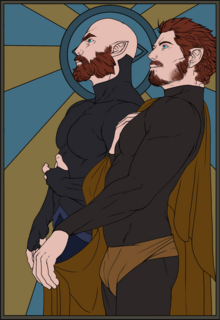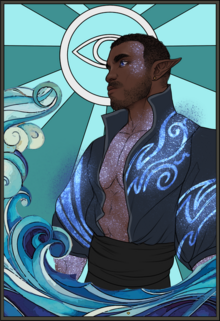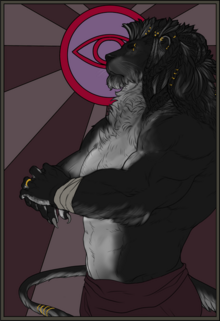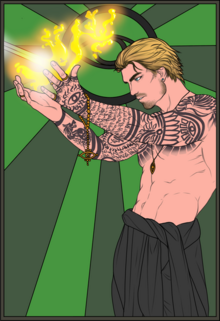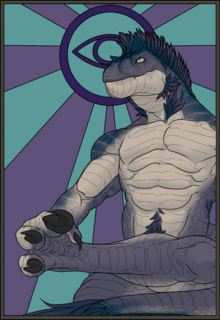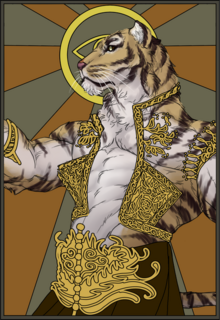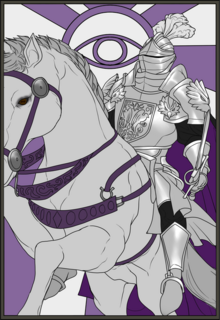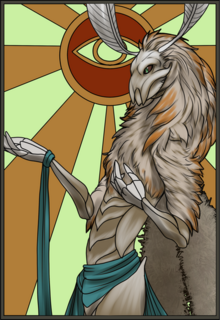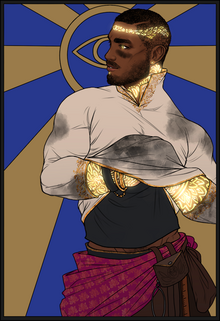More actions
No edit summary |
No edit summary |
||
| Line 5: | Line 5: | ||
|deities = The Everwatcher and various other Gods and Goddesses | |deities = The Everwatcher and various other Gods and Goddesses | ||
|subsects = | |subsects = | ||
* [[Evintarian | * [[The Evintarian Cult]] | ||
* [[Guided | * [[The Guided Cult]] | ||
|}} | |}} | ||
==Origins== | ==Origins== | ||
In the process of Revision... | |||
==Schisms== | ==Schisms== | ||
In the process of Revision... | |||
==Core Identity== | ==Core Identity== | ||
In the process of Revision... | |||
===Beliefs=== | ===Beliefs=== | ||
In the process of Revision... | |||
==Gods and Goddesses== | ==Gods and Goddesses== | ||
Unionism | Unionism differs from other Religions, in that it has Duo-Gods. All Duo-Gods are divine and each have divine powers in the afterlife (though some Gods may be yet living). Unionists worship all Gods equally, though they may choose specific Patron gods which they worship more. The Everwatcher acts like an overarching God of Gods, but the Everwatcher cannot directly be interacted with, so most people end up praising the Everwatcher through the Gods and Goddesses. Unionism also has the Cults further below. Cults add Gods onto the standard Pantheon, but they are not mandatory for vanilla Unionists who don't worship the Cults. It is possible to be a believer of both Cults. | ||
<table style="width: 100%;"><tr><td style="width: 50%; vertical-align: top; text-align: left;"> | <table style="width: 100%;"><tr><td style="width: 50%; vertical-align: top; text-align: left;"> | ||
<span style="font-size:150%;><center>'''Prophet Gods Theomar and Thedmir'''</center></span> | <span style="font-size:150%;><center>'''Prophet Gods Theomar and Thedmir'''</center></span> | ||
| Line 58: | Line 52: | ||
* '''Enemies:''' Murderers, people who adopt adults, people who attack medics/the unarmed. | * '''Enemies:''' Murderers, people who adopt adults, people who attack medics/the unarmed. | ||
* '''Rituals:''' Ness and Eora rituals are all about forgiveness and nurturing and healing others. This may involve taking confessions, but can also involve volunteering at a medical station or healing house. Furthermore, Ness and Eora faithful travel prisons and downtrodden areas to give forgiveness to the damned, and offer them love and kindness where there is only the cold sting of rejection and apathy to the fates of the forgotten. | * '''Rituals:''' Ness and Eora rituals are all about forgiveness and nurturing and healing others. This may involve taking confessions, but can also involve volunteering at a medical station or healing house. Furthermore, Ness and Eora faithful travel prisons and downtrodden areas to give forgiveness to the damned, and offer them love and kindness where there is only the cold sting of rejection and apathy to the fates of the forgotten. | ||
|} | |||
</center> | |||
</tr></table> | |||
<table style="width: 100%;"><tr><td style="width: 50%; vertical-align: top; text-align: left;"> | |||
<span style="font-size:150%;><center>'''Pure Gods Juvin and Glanzia'''</center></span> | |||
{| | |||
[[File:Talli.png|220px|caption|left]] | |||
| | |||
* '''Name:''' Glanzia (left) Goddess of Pure Soul, and Juvin (right) God of Pure Reason. | |||
* '''Patron:''' Intellectuals, Mundanes, Anti-Magi, Scholars, Teachers, Archeologists. | |||
* '''Symbols:''' Books with the Unionist Eye and Black Granite statues of Heroes. | |||
* '''Role:''' To teach the faithful purity of soul (Magic-apprehension) and Logic. | |||
* '''Traits:''' Analytical, Apprehension, Thoughtfulness, Anti-Magical, Purist. | |||
* '''Temple:''' Temple of Greater Understanding, which doubles as a Library. | |||
* '''Allies:''' Lothar Knights, Melca Worshipers, Severena & Aurora Worshipers. | |||
* '''Enemies:''' Mage-Radicals, Theurgists, Those with Demon/Arken Pacts and Deals. | |||
* '''Rituals:''' Theomar and Thedmir Rituals involve re-enacting the struggles of them in the early days of Unionism. This involves preaching the faith to non believers, aiding the faithful in the defense of their holy shrines and places of worship, to mediate and act as diplomat for embattled groups, and to provide spiritual guidance to the Military. Theomar and Thedmir also have rituals concerning the sanctification and re-affirmation of friendship. | |||
|} | |||
</td><td style="vertical-align: top; width: 50%;"> | |||
<span style="font-size:150%;><center>'''Martial Gods Allest and Alexander'''</center></span> | |||
{| | |||
[[File:GAYS.png|220px|caption|left]] | |||
| | |||
* '''Name:''' Allest (right) God of Warriors, Alexander (left) God of Gladiators. | |||
* '''Patron:''' Soldiers, Generals, Commanders, Gladiators, Warriors, Homosexuals. | |||
* '''Symbols:''' Two crossed holy swords, one with blood, and one dripping with tears. | |||
* '''Role:''' To encourage fraternity and loyalty in the army, and strength of arms in warriors. | |||
* '''Traits:''' Brave, Boisterous, Glorious, Victorious, Martial, Dependable, Unwavering. | |||
* '''Temple:''' The Divine Heroic Contemplation Temple in Gloomrot Forest in Regalia. | |||
* '''Allies:''' Cemaan Worshipers, Bard & Njal Worshipers, Bloodcast Knights. | |||
* '''Enemies:''' Pacifists, cowards, enemies of Unionism and those who attack Priests. | |||
* '''Rituals:''' Allest and Alexander were lovers in live and death, where most of their rituals involve some kind of brotherly oath, a promise to protect someone until one's dying breath, or swearing fealty and undying loyalty to an overlord in war. Allest and Alexander were glorious warriors each in their own right, so in many ways, prayer before battle and battle itself is a form of worship in their names, as is love persevering through war. | |||
|} | |||
</center> | |||
</tr></table> | |||
<table style="width: 100%;"><tr><td style="width: 50%; vertical-align: top; text-align: left;"> | |||
<span style="font-size:150%;><center>'''Protector Gods Elia and Leona'''</center></span> | |||
{| | |||
[[File:LESBIANS.png|220px|caption|left]] | |||
| | |||
* '''Name:''' Elia (left) Goddess the Watchful Gaze, and Leona (right) Goddess of Knights. | |||
* '''Patron:''' Guards, Knights, Hunters, Rangers, Explorers, Scribes, and Lesbians. | |||
* '''Symbols:''' Elia's Longbow and Leona's Blacksteel sword, along with Blacksteel in general. | |||
* '''Role:''' To teach the faithful to guard one another and be responsible for one another. | |||
* '''Traits:''' Chivalrous, Alert, Mindful, Responsible, Dedicated, Precise, Awareness. | |||
* '''Temple:''' Temple of Unyielding Overwatch which doubles as the Imperial Hunting Lodge. | |||
* '''Allies:''' Urlan, Knights of all Kind, Metropolitan Guards, Tame Marken, Huntsmen. | |||
* '''Enemies:''' Criminals, Monsters in the wild, Kathar, Argentum Knights, Womanizers. | |||
* '''Rituals:''' Elia and Leona were lovers in life and death, where most of their rituals involve some kind of communal or co-operative practice of the hunt or respect and support of the Knights (as well as being Knights). Knighthood is considered the greatest form of "keeping watch over society", and so many of their patrons become Knights. Other forms of rituals are couple or group hunts, and inspections of garrisons and walls and armories. | |||
|} | |||
</td><td style="vertical-align: top; width: 50%;"> | |||
<span style="font-size:150%;><center>'''Vessel Gods Alexander and The Everwatcher'''</center></span> | |||
{| | |||
[[File:Alexander.png|220px|caption|left]] | |||
| | |||
* '''Name:''' Alexander (see) Emperor of Regalia and The Everwatcher (not depicted). | |||
* '''Patron:''' Alexander is the Vessel of the Everwatcher, He speaks through him only. | |||
* '''Symbols:''' The Unionist Eye represents the Everwatcher, the Crown Alexander. | |||
* '''Role:''' To be living embodiment of the divine will of the Everwatcher in Regalia. | |||
* '''Traits:''' Divine, Sagely, Wise, All-Loving, All-Inclusive, All-Caring. | |||
* '''Temple:''' The Imperial Palace in essence doubles as the Temple of the Vessel. | |||
* '''Allies:''' Cemaan Worshipers, Bard & Njal Worshipers, Bloodcast Knights. | |||
* '''Enemies:''' Pacifists, cowards, enemies of Unionism and those who attack Priests. | |||
* '''Rituals:''' There aren't strictly any rituals for Alexander, as he is only the Temporary Vessel. When Alexander dies, the next Emperor will take his place as the Vessel God, so that only ever the living Emperor will be Vessel God. It's also worth noting that while both Gladiator God Alexander and Vessel God Alexander bear the same name, they are different people, the former is an ancestor of the latter, so the latter is styled "Alexander II". | |||
|} | |} | ||
</center> | </center> | ||
Revision as of 02:42, 14 October 2023
| Unionism | |
|---|---|
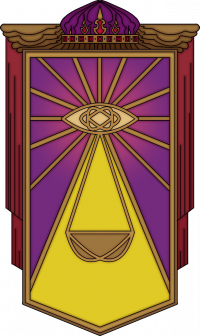 | |
| Religion | |
| Pronunciation | Yoon-yen-is-m |
| Origins | Emperor Theomar |
| Deities | |
| The Everwatcher and various other Gods and Goddesses | |
Origins
In the process of Revision...
Schisms
In the process of Revision...
Core Identity
In the process of Revision...
Beliefs
In the process of Revision...
Gods and Goddesses
Unionism differs from other Religions, in that it has Duo-Gods. All Duo-Gods are divine and each have divine powers in the afterlife (though some Gods may be yet living). Unionists worship all Gods equally, though they may choose specific Patron gods which they worship more. The Everwatcher acts like an overarching God of Gods, but the Everwatcher cannot directly be interacted with, so most people end up praising the Everwatcher through the Gods and Goddesses. Unionism also has the Cults further below. Cults add Gods onto the standard Pantheon, but they are not mandatory for vanilla Unionists who don't worship the Cults. It is possible to be a believer of both Cults.
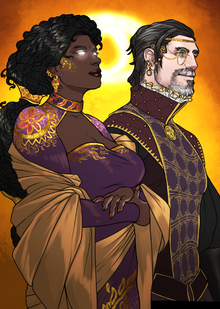
|
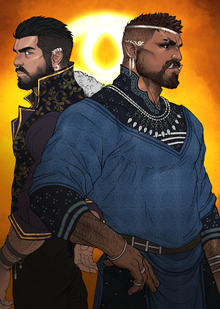
|
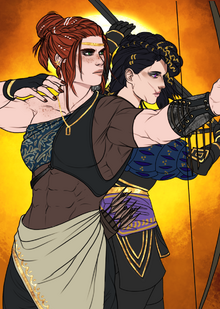
|
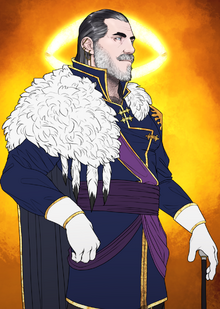
|
OLD LORE BELOW HERE
|
|
|
|
|
|
|
|
|
|
|
|
|
|
|
|
|
|
|
|
Priestly Activities
Dogmatic Unionist priests are part of the so-called Dogmatic Religious Community. At the very top is the Concilly Council. Originally this organization had a leader called the Supreme Reverend, however the Supreme Reverend position was abolished when the last Supreme Reverend discovered insidious corruption within the religious community, tried to expose it, and was assassinated for it. To compensate, Conclave determined that the Dogmatic community should henceforth be ruled by a Council of elder Arch-Celates. Below the Concilly Council, are the Arch-Celates, which are equivalents to Dukes in the Regalian Empire. They wield considerable power and rule over vast areas of land, subdivided into Celeries. Below the Arch-Celate is the Celate, or just the average priest. Each Celate administrates a Celerie, which is usually a piece of land donated to the clergy where they maintain temples, shrines, and convents, while also producing crops and tending to cattle. Celates perform all religious tasks such as confession, preaching, hearing concerns, and simply taking care of Unionist needs like a social caretaker or mental health worker. Arch-Celates on the other hand are more administrative in that they take care of the treasury, any military attached to the religious orders, and communication between the Concilly Council and the vast wide-spread Unionist elements. Formally the Emperor is the leader of the Holy Seat, which is more of a group term for the Palace and the Concilly Council grouped together, but historically Emperors have interfered very little in the day to day running of the Celeries, and as such, this fact is usually ignored, the Emperor being considered a completely independent entity. This has also historically separated the Emperor from controversy among the Celates, and vice versa.
The Nuance of Godly Tribalism
For those who have lasted long enough to read to this point, it should have become obvious that not all Gods and Goddesses see eye to eye, and that some of them even directly contradict each other. While the Creed theoretically exists to apply the correct interpretation and lessons to be learned from the Gods and Goddesses, reality often finds for example Elen and Taal followers at odds, and Elia and Niall & Nolan followers at odds because of ideological differences. Unionism does not demand the universal worship of every God and Goddess, often the faithful only pick a few that really apply to them, after all, why would an Anglian peasant worship the God of King and Emperors if only in passing to praise his name for the Creed and Prophecy. No God or Goddess is also more or less correct than another, in the eyes of the Everwatcher, each God has some degree of validity, and some degree of error which is prone in the Sin of Creation, both in the fact that even Gods and Goddesses can sometimes act in error, but also in that mortals can apply the wrong interpretation of their lessons to reality around them. It is important never to call another Character a heretic for preferring one God or Goddess over the other and disregarding the preaching of one to uphold those of another.
Trivia
- Unionism used to be mandatory for nobility somewhere during the second century after Cataclysm, though this Holy Law was removed when the war against the Skagger Horde ceased, and the Empire benefited more from including non-Unionists into the peerage. An exception had always been made for the Altalar nobles of Solvaan origins in Solleria however, called the Confessions of Melennar.
- Sectarian violence largely came to an end at the turn into the fourth century as the last attacks on Vultragon Unionist by state forces ceased, and an uneasy truce was signed between the Schism religious communities. They still do not see eye-to-eye, and the different Schismatic groups still prod at each other, but instead of murdering each other over sectarian differences, they mostly fight with words nowadays, a legacy of the Kleine Rechnung, the document that called for the truce.
- Despite Elen's absorption into Unionism, the Breizh still maintained a high level of cultural autonomy, some even clinging to old beliefs. As such, even when Magic became illegal in the Empire, the Breizh Aelrrigan Order continued to find and train Mages safely in their sanctuaries while the rest of the Empire turned to brutal oppression (and the Magic part of Elen was suppressed from dogma). Elen's faithful among the Aelrrigan Order are commonly cited as the reason why Magic acceptance eventually returned, and Elen's magical nature in theological teachings was returned.
| ||||||||||
| Accreditation | |||||||
|---|---|---|---|---|---|---|---|
|
| ||||||
